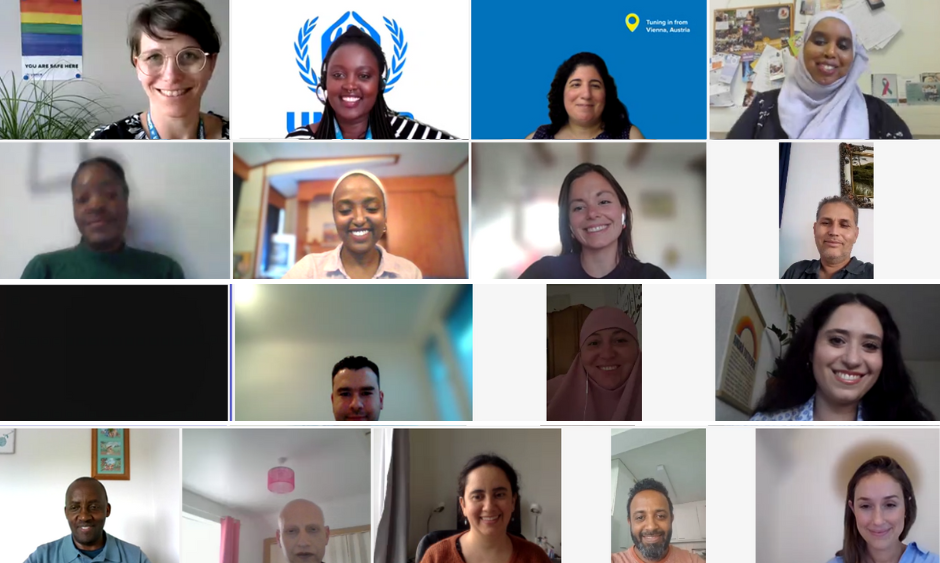Ms Sophie Magennis, Head of Office at UNHCR Ireland speaks at FGM appreciation ceremony
Ms Sophie Magennis, Head of Office at UNHCR Ireland speaks at FGM appreciation ceremony
Ms Sophie Magennis, Head of Office at UNHCR Ireland, delivered this speech on Friday 15 June 2012 at the FGM Appreciation Ceremony to mark the recent passing of the Criminal Justice (Female Genital Mutilation) Act 2012. The event, organised by Ifrah Ahmed and the United Youth of Ireland, and held at the Mansion House, was also attended by the Lord Mayor, Andrew Montague, Minister of State for Trade and Development, Joe Costello TD and Emer Costello MEP.
Speech by Ms Sophie Magennis, Head of Office, UNHCR Ireland.
Lord Mayor, Minister Costello, Emer Costello MEP, colleagues and friends, I would like to start by thanking Ifrah Ahmed for inviting UNHCR to speak at this important Appreciation Ceremony to mark the recent passing of the Criminal Justice (Female Genital Mutilation) Act 2012. We have been very fortunate to have a great relationship with Ifrah, who has worked closely with our Office on many projects over the past number of years.
For those of you who may not be familiar with the work of the United Nations High Commissioner for Refugees or UNHCR for short, we are the UN Agency mandated to protect and promote the rights of refugees, asylum seekers and stateless person.
The promotion of gender equality and work towards the elimination of violence against women are integral parts of UNHCR’s protection mandate, internationally and in Ireland.
Sexual and gender based violence, which includes the practice of FGM, remains the most widespread and serious protection problem facing displaced and returnee women and girls. Because of this, preventing and responding to this violence are integral parts of UNHCR’s strategy to enhance the protection of women and girls. The development of strategies to address sexual violence, including domestic violence, against refugee women” is one of UNHCR’s Five Commitments to refugee women.
UNHCR considers FGM to be a form of gender-based violence that inflicts severe harm, both mental and physical, and amounts to persecution. The recognition of FGM as a form of persecution is supported, by international and regional human rights law. All forms of FGM violate a range of human rights of girls and women, including the right to non-discrimination, to protection from physical and mental violence, to the highest attainable standard of health, and, in the most extreme cases, to the right to life.
FGM also constitutes torture and cruel, inhuman or degrading treatment as affirmed by international jurisprudence and legal doctrine, including by many of the UN treaty monitoring bodies, the Special Procedures of the Human Rights Council, and the European Court of Human Rights. To expel or return a girl or woman to a country where she would be subjected to FGM would amount to a breach by the State concerned of its obligations under international human rights law.
UNHCR sincerely welcomes the recent passing of the Criminal Justice (Female Genital Mutilation) Act 2012, which has been in the making in one form or another for over ten years. We look forward to the commencement of the Act which is due to happen – we understand - before the summer recess.
We would like, in particular to applaud the work of Ifrah Ahmed, the United Youth of Ireland and all those involved in Ireland’s national plan of action to address FGM, for their tireless commitment and hard work in advocating for the introduction of this legislation. We would also like to commend Senator Ivana Bacik for introducing the Bill in 2010 and for her commitment and work in bringing it to this point. The support of Minster Costello and Emer Costello MEP over the years has also been instrumental to the achievement of the developments to date.
At the international level, we welcome the European Parliament resolution on ending female genital mutilation passed just this week which calls on Member States to continue to ratify international instruments and implement them through comprehensive legislation that prohibits all forms of female genital mutilation. The passing of the Criminal Justice (Female Genital Mutilation) Act 2012 in Ireland now brings Ireland in line with a number of other EU Members States which have developed specific criminal legislation on FGM.
Other developments at European Level include the adoption of The Istanbul Convention on preventing and combating violence against women and domestic violence. The Convention includes a provision on criminalizing FGM and on the need for gender sensitive asylum procedures. We would encourage the Irish authorities to to sign and ratify this new Convention.
UNHCR is committed to ensuring that those involved in the asylum decision making processes at national are aware of the prevalence of FGM in countries of origin of applicants and take full account of the risk of FGM when considering applications for asylum.
We look forward to continuing to work with organisations working in this area and to support their activities wherever possible. The enactment of the legislation is a great achievement however, we need to maintain our focus on awareness raising and prevention strategies with a view to removing the threat of FGM from girls and women living in Ireland.
I would like to conclude by congratulating Ifrah on the organisation of this appreciation ceremony. Too often, once an advocacy goal has been achieved, we don’t take the time to mark that achievement and to recognise the work, commitment and energy that are involved in successfully advocating for an important change in policy or the introduction of legislation. I know that Ifrah will continue to advocate at a community and international level for the eradication of FGM and the support of women and girls who have undergone FGM. Her tireless dedication to this issue is an absolute inspiration to so many people affected by or working towards the prevention and eradication of FGM in Ireland and internationally.





